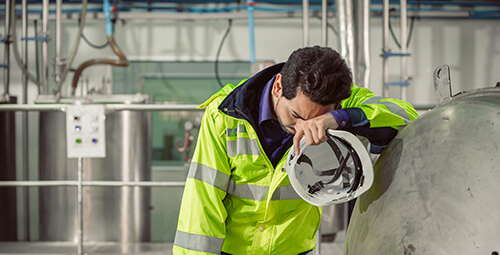Just like cranking a car, a warm up gets your body working and ready for the day ahead.
Many people think that warming up is done only before playing sport. This is not the case. Warming up prepares both the body and mind for more strenuous activity such as the tasks you perform every day at work.
Think about how you start your day: In the mornings our bodies are generally cool. We have been in bed for the past 8 hours, gotten up, had some breakfast and then driven to work – not really considered strenuous work. Therefore, the body and its muscles are not necessarily prepared to handle the work tasks ahead.
A warm up is a great, refreshing way to start your shift. Additionally, if you’ve just finished your lunch break, blood flow is being diverted from your muscles to your digestive tract to help you metabolise your food. Therefore, a brief warm up before you return to work will help you get the blood flowing back to your muscles and brain again – which leaves your mind and body ready for work. Similarly, if you’ve hit a mid-afternoon slump, try an afternoon warm up instead of a chocolate bar or coffee!
Some of the specific benefits of a short warm up include:
- Fatigue busting: a warm up increases the hormones that help regulate energy production. An effective warm up can also initiate sweating signals which will improve the cooling mechanisms and assist in thermoregulation while they work. Both of these are excellent at helping to delay the onset of fatigue.
- Heart: increased heart rate and improved blood flow from a warm up reduces cardiovascular strain and improves nutrient delivery to muscles and joints.
- Brain: mental preparation can enhance task focus for improved efficiency and decreased accident risks.
- Improved range of motion: more ‘elastic’ muscles make for less resistance and reduced internal strain on your joints. Movement also stimulates joint lubrication.
- Muscle temperature: warmer muscles contract smoothly and more efficiently, reducing the risk of straining.
Preparing muscles for a day’s work can also alleviate seemingly unrelated body aches because a tight muscle in one spot can lead to pain in other areas.
For example, consider you are experiencing tight hamstrings. When hamstrings are tight it can lead to lower back, knee and hip pain. Tight hamstrings can prevent the knees from straightening or the pelvis from ‘untucking’. A tucked pelvis is the primary cause of pelvic floor disorders and lower back pain. For a strong pelvic floor and back pain relief, lengthening the hamstrings is a requirement.
In summary – Warming up before you start your day can help build and improve your muscle strength. It helps muscles become more pliable, flexible and ready for movement as well as increase blood flow. More blood means more oxygen to the muscles meaning they can work more efficiently at less risk of injury. In addition, the brain needs oxygen to function well so a warm up is also a great way to stay focused and mentally sharp.
Find out more – Would you like to learn more about how a proper warm up for work routine can benefit your workforce? Or are you ready to implement regular warm up for work routines? We can help educate your staff, train ‘warm up for work champions’ to run regular warm up for work routines, or we can deliver them for you. Chat to us today about the many options available.





